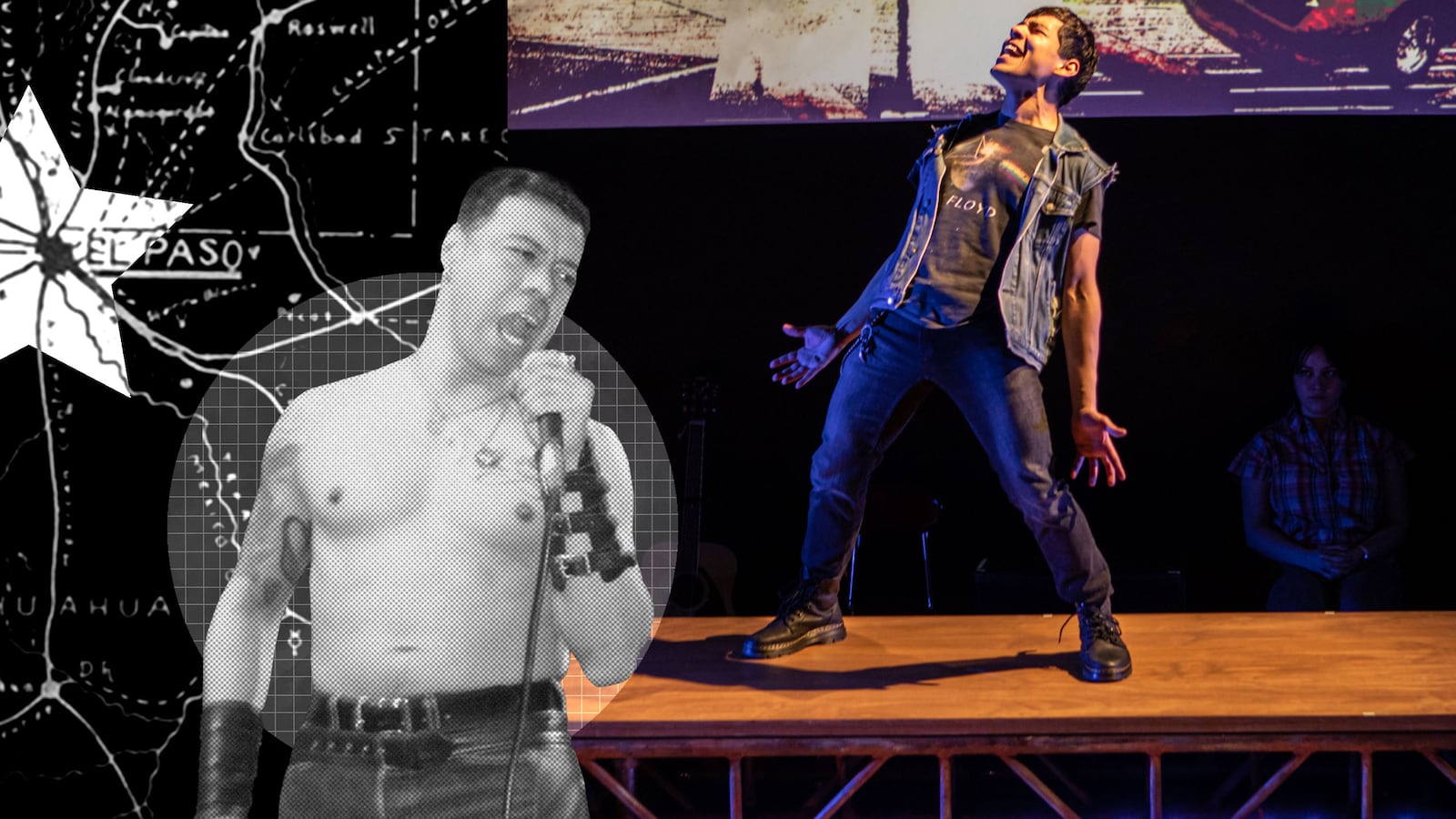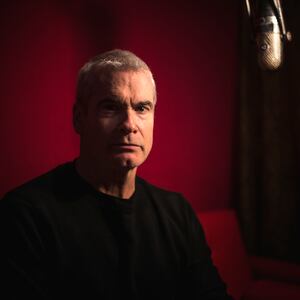When he was in high school in the 1980s, David Anzuelo remembers seeing the now legendary punk gods, The Clash, at a concert at the local university in his hometown of El Paso. “INXS opened for them,” he recalled to The Daily Beast. “The audience was all pissed off because they couldn’t rip out the seats.”
Over 30 years later, Anzuelo is channeling that same punk rock rage in his new off-broadway debut play, Día Y Noche, which opens March 26 at 59E59 Theater as part of Labyrinth Theater Company’s 30th anniversary season.
A semi-autobiographical tale set to classic punk anthems, the play tracks Danny and Martin, two young music lovers who feel like outsiders, as they navigate their adolescence in 1984 El Paso. Drugs, sex, and rock and roll, of course, are all featured heavily.

Freddy Acevedo, Emma Ramos and the cast of Día Y Noche.
Monique Carboni“Mexicans and Chicanos love heavy metal,” Anzuelo says. “And they always have.” That, in part, is due to the complex identity issues Mexican Americans face growing up on the border, in between two cultural worlds. Anzuelo says he didn’t feel truly Mexican or American growing up, which led to ostracization and feeling marginalized in both communities.
For Anzuelo and countless others in El Paso, punk music was not only an escape from that binary, but their being, inherently subversive, actualized as music. Raucous all-age shows at now long gone clubs that hosted bands like The Germs were not only the norm for Anzuelo and kids like him in El Paso, they were necessary. Moshing, scream singing and even getting clocked in the face while the loud scrappy music blared was cathartic Anzuelo says. “It’s a form of joyful aggression.”
El Paso, in fact, has a rich history of punk, metal, and hardcore music where a DIY community of working class youths, many of whom were Mexican Americans, came together to express that joyful aggression in the face of racism, prejudices, and the patriarchy. That tradition has continued on through successful bands like The Mars Volta and Sparta and is central to the play. “My story is not an immigration story,” Anzuelo says. “It’s the story of navigation of dual identity…the reclamation of language and history.”
In Día Y Noche protagonist Danny, Anzuelo’s avatar, recounts to his new friend, Martin, who is Black and deeply in the closet, how an older Anglo woman once called him a “dirty Mexican” when he was only 4 years old. “I never saw that woman again,” he says. “But I’ll remember her for the rest of my life.” It’s just one of the many real life details that punctuate the show’s narrative and highlight Anzeulo’s broader goal of reclaiming his history.

David Anzuelo, left, circa 1984 with foreign exchange buddies.
Conrad Bower/Courtesy of David Anzuelo“On a molecular level,” he told The Daily Beast, “I just want to tell my story and create.”
That story is one of subversion and survival. As a theater major at the University of Texas El Paso in the 80s, racist professors told him he’d never book gigs because of his looks. “You look like a servant,” they told him.
Anzuelo sold his childhood bedroom set for the money he needed and transferred to a university in New Mexico where he hung out with goth kids and founded an experimental theater company. Administrators, though more accepting and helpful, were convinced he was a devil worshiper because of his black clothes, costume makeup, and out there theater work. “I ran around the campus at night under the full moon as part of a werewolf series once,” he said with a laugh.
After graduating, Anzuelo moved to New York City in 1989 where he quickly got work as an Elvis impersonator for a music and dance review that toured the New England carnival circuit. “We opened for Reba McIntire,” he said proudly, before adding a caveat. “Other times we opened for dancing donkeys.”

David Anzuelo singing with his band, MonsterRally circa 2007. To his right on bass is actor Raul Castillo.
Courtesy of David AnzueloSince then he’s ditched the donkeys and steadily has worked as an actor in film, TV, and stage productions across the country and is a member of the Labyrinth Theater Company acting ensemble. Music and the punk scene, however, have never been too far. He fronted his own band, MonsterRally, in the early aughts with fellow Tejano actor Raul Castillo and has performed with local rockers, The Gotham Roots Orchestra. He’s currently obsessed with L.A. rocker Alice Bag. “Look,” he says, showing me a picture of a dark-skinned woman with lemon yellow hair. “She’s a middle-aged Mexicana punk chick, she’s just so cool.”
Now 57 and happily married, Anzuelo continues to subvert and survive. Doctors told him he wouldn’t live past the age of 50 when he was diagnosed with HIV at 35. “But here I am,” he said. A self described pansexual, he runs with a crowd that includes radical faeries, drag queens, and baby gays all in search of their own artistic expression. “I’m Uncle Dave to them,” he said.
He hopes Brown and Black queer youths see themselves in Día Y Noche and are inspired to make their own art, the same way he was inspired when his father showed him the VHS of Luis Valdez’s musical drama Zoot Suit back when he was 16. “I had never seen theater that was about the Chicano and Mexican experience,” he says. “I only had Cheech and Chong.”
For Chicano punks and queerdos looking for themselves onstage, they now have Día Y Noche.







